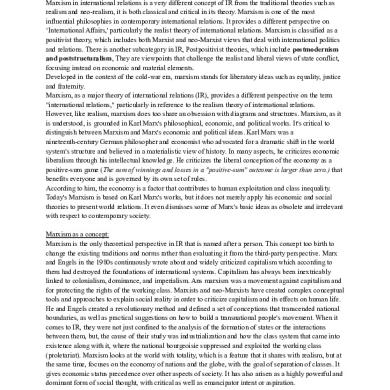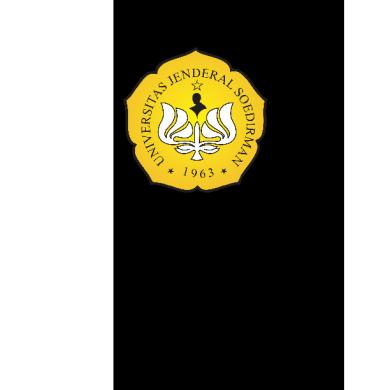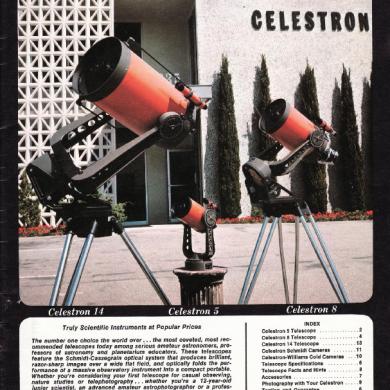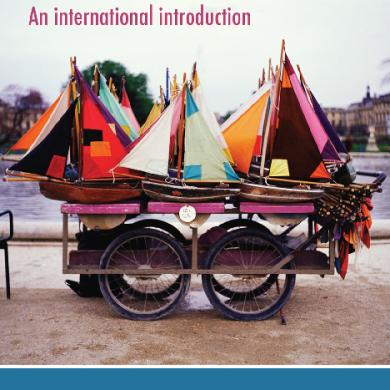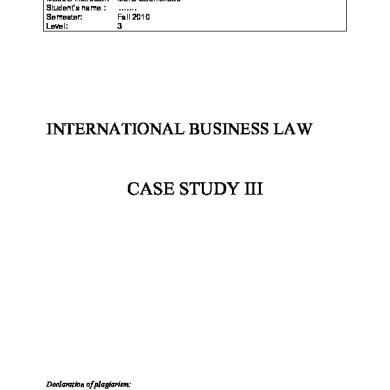* The preview only shows a few pages of manuals at random. You can get the complete content by filling out the form below.
Description
Intro: Marxism in international relations is a very different concept of IR from the traditional theories such as realism and neo-realism, it is both classical and critical in its theory. Marxism is one of the most influential philosophies in contemporary international relations. It provides a different perspective on ‘International Affairs,' particularly the realist theory of international relations. Marxism is classified as a positivist theory, which includes both Marxist and neo-Marxist views that deal with international politics and relations. There is another subcategory in IR, Postpositivist theories, which include postmodernism and poststructuralism, They are viewpoints that challenge the realist and liberal views of state conflict, focusing instead on economic and material elements. Developed in the context of the cold-war era, marxism stands for liberatory ideas such as equality, justice and fraternity. Marxism, as a major theory of international relations (IR), provides a different perspective on the term "international relations," particularly in reference to the realism theory of international relations. However, like realism, marxism does too share an obsession with diagrams and structures. Marxism, as it is understood, is grounded in Karl Marx's philosophical, economic, and political works. It's critical to distinguish between Marxism and Marx's economic and political ideas. Karl Marx was a nineteenth-century German philosopher and economist who advocated for a dramatic shift in the world system's structure and believed in a materialistic view of history. In many aspects, he criticizes economic liberalism through his intellectual knowledge. He criticizes the liberal conception of the economy as a positive-sum game (The sum of winnings and losses in a "positive-sum" outcome is larger than zero.) that benefits everyone and is governed by its own set of rules. According to him, the economy is a factor that contributes to human exploitation and class inequality. Today's Marxism is based on Karl Marx's works, but it does not merely apply his economic and social theories to present world relations. It even dismisses some of Marx's basic ideas as obsolete and irrelevant with respect to contemporary society. Marxism as a concept: Marxism is the only theoretical perspective in IR that is named after a person. This concept too birth to change the existing traditions and norms rather than evaluating it from the third-party perspective. Marx and Engels in the 1980s continuously wrote about and widely criticized capitalism which according to them had destroyed the foundations of international systems. Capitalism has always been inextricably linked to colonialism, dominance, and imperialism. Ans marxism was a movement against capitalism and for protecting the rights of the working class. Marxists and neo-Marxists have created complex conceptual tools and approaches to explain social reality in order to criticize capitalism and its effects on human life. He and Engels created a revolutionary method and defined a set of conceptions that transcended national boundaries, as well as practical suggestions on how to build a transnational people's movement. When it comes to IR, they were not just confined to the analysis of the formation of states or the interactions between them, but, the cause of their study was industrialization and how the class system that came into existence along with it, where the national bourgeoisie suppressed and exploited the working class (proletariat). Marxism looks at the world with totality, which is a feature that it shares with realism, but at the same time, focuses on the economy of nations and the globe, with the goal of separation of classes. It gives economic status precedence over other aspects of society. It has also arisen as a highly powerful and dominant form of social thought, with critical as well as emancipator intent or aspiration.
According to Marx, anything that has large power also has the power to emancipate. Marxism advises that concepts are not just meant to help us understand the world – they should also help us change it. According to Marx, “philosophers had only interpreted the world whereas the real point was to change it” Marxism believed in revolutionary actions that would help in achieving enlightenment ideals of liberty, equality, and fraternity, which would free all human beings from exploitation and domination in the new world. As a result, we may claim that Marxism remains relevant for us since it provides a comprehensive understanding of capitalist globalization and fragmentation. Marxism in International Relations. To comprehend the international system, the Marxist approach to international politics focuses on the totality. Its fundamental goal is to bring about a radical transformation in the way the international system works, which is now preoccupied with war, terrorism, poverty, and other forms of human suffering. From the perspective of the global south, the Marxist approach to the study of international relations offers a major theoretical vantage point for understanding not only the reality of imperialism and the character of capitalism but also its influence on the developing and less-developed globe. For Marx, capitalism played a negative role in the lives of humans, but at the same time, it had become so powerful that it took control of the world. And because of the same, humans were trapped in the class system which was in favour of the bourgeoisie, creating an international system of division of labour, exploiting the workers and ultimately turning them into mere accessories to the capitalist machine. For him, capitalism was an exploitation system in which capitalists monopolised the proletariat's labour-power and profited from it. It was the source of a sense of alienation in which the entire human race, including the bourgeoisie, was at the mercy of the institutions and forces that it had created. Marx's fundamental political purpose and the focus of his attempts to grasp the principles of capitalism and the overall evolution of human history was to put an end to this alienation, oppression, and detachment. Marx has borrowed a lot of ideas from Hegel. However, Marx recognised that members of the Hegelian movement had overlooked the historical significance of technology (forces of production) and production relations (the separation between owners and those who must work for them). For Marx, a left-Hegelian religious belief was an expression of people's unhappiness and ambitions as they struggled with the material realities of everyday life, rather than an intellectual error that could be rectified by philosophical investigation. Marxism fundamentally questions the meaning of the term "international" in the field of international relations. Marxists argue that such conceptions are problematic because they lead us to believe in illusions or myths about the reality, whether it is anarchy for realists or international society for the English school. Marx analysed the society in a materialistic way rather than a idealistic analysis of society. Historical materialism is Marx's major hypothesis for thedevelopment of capitalism. Materialistic conditions as defined are the conditions that allows on individual to survive or sustain in the society. According to Marx, we understand society by the existing arbitrary ideas on various units of society like family, marriage, religion and the like. And these arbitrary ideas are created by different agencies. Acc to Marx, it is the human beings that have a certain kind of agency that changes the world around us. It is not the idea that is changing, it is these agencies that cause the change. Therefore, Marxism asserts that material conditions can be changed by the actions of human beings as well as by events. And capitalism was one such agency, according to Marx, created a change and it always wanted to grow and expand, which is
called as the cyclical rhythm of capitalism. Marx acknowledged the fact that capitalism was a patriarchal system and it does not go anywhere, instead it changes its form. By forcing members of the working class to compete with each other for employment, it managed to divide humanity. Economic issues in the society constitute the base in the Marxist political philosophy; every other aspect, such as politics, culture, education or religion, remains at the superstructural level, dependent on economic factors. Marxists argue that socialism can realise the claims to freedom and quality that capitalism now has. Marx's critique of capitalism must be viewed in this light: it is a critique from inside the capitalist order, not an outside threat. Immanuel Wallerstein: ‘world systems theory’ The first application of Marxist ideas to explain international processes was by communists and revolutionaries of the early twentieth century such as Rosa Luxemburg, Rudolf Hilferding and Vladimir Lenin, etc. In his major work "Modern World System: Capitalist Agriculture and the Origins of the European World Economy in the Sixteenth Century (1974)," Wallerstein provides a compelling presentation of modern world system theory. In terms of wealth accumulation and economic development, he studies capitalism's emergence in sixteenth-century Europe and its evolution into a globe capitalist system that includes 1. Core, 2. Periphery, and 3. Semi-Periphery. Wallerstein's method employed many units of analysis and took a much longer-term view of state history and interconnections. The goal was to understand how states have evolved in relation to one another since the sixteenth century, resulting in interdependence between different groups of nations based on the specific types of economies and industries they specialised in. Both the theories use the terminology ‘centre’ and ‘periphery’, where the former means the core or locus on which the latter is dependent, hence the name dependency theory. There are minimal differences between dependency theory and Marxism. Its main goal is to redistribute raw materials from poor to capitalist countries. Underdog countries rely on capitalist countries to keep their economies afloat. They are also governed by top dog states, who impose military and economic restrictions. As a result of these dependencies and groups, we need to think about the world in terms of larger units than states. These units – or world systems – aided in resolving the conundrum of why all governments became capitalist, albeit in extremely unequal and disparate ways. Democratic governments that pay high wages and encourage high levels of investment and social services are referred to as the core group of states (e.g., in Western Europe and North America). Authoritarian administrations in the semi-periphery (for example, in Latin America) provide low wages and poor welfare services to its inhabitants. Periphery states (e.g., Sub-Saharan and Central Africa, South Asia) are non-democratic regimes in which workers can expect earnings below subsistence levels and no social services. The enormous impoverished and less developed portion of the "third world" constitutes the "Periphery" in the postcolonial international, which has been providing raw commodities such as minerals and timber to maintain the core's order. Historically, the "core" has been prosperous industrial regions engaged in enterprises such as banking, manufacturing, technologically advanced agriculture, shipbuilding, and other forms of economic progress. Throughout history, the core has exploited the periphery and amassed riches that has aided the core regions in the development of their industrial infrastructure. The items were largely made in the core
regions using capital that these regions had amassed in large amounts. The peripheral regions primarily contribute raw resources and inexpensive labour to the core, but they are mostly ignored by the core when it comes to capital flow to the periphery. In other words, while certain governments' groups have altered over time (for example, from periphery to semi-periphery), capitalism will always require a peripheral region to supply the means for the core to maintain a high standard of consumerism and security. Neo-Gramscianism and International Relations The term neo-Marxism does not refer to a single theory or approach to world politics; rather, it refers to a combination of various schools of thought and approaches from the twentieth century, such as world system theory and dependency theory, Gramscian notions of 'hegemony,' and critical theory based on Kant, Hegel, and Marx's influences. To question the dominance of the "realist" approach in this academic domain, contemporary radical researchers have leaned on Antonio Gramsci's ideas. Robert Cox is a neo gramscian, who refuses to be labelled a Marxist, claiming that what he has done is apply concepts taken from a selective reading of Gramsci to the study of international politics. The concept of hegemony is the most crucial concept he adopts. It mainly deals with the domination of one group over others and the types of groups and relations of dependecy between them. Unlike Lenin, Gramsci expanded the concept of hegemony to include not only interactions between oppressed lower classes and the working class, but also hostile classes such as rulers and controlled. While an aspirational bourgeoisie portrays his war against feudal relations as a universal struggle for freedom, it accepts the task of leading the subordinate classes in order to ensure its own interests; once in power, it continues to "lead" or retain hegemony over the other classes. As a result, he defines hegemony as a conjunction of coercion and consent. Hegemony is defined as “the subtle forms of ideological control and manipulation perpetuated within what is known as civil society (through institutions such as the educational system, churches, and the media) that tries to fortify restrictive and repressive structures that uderlies in capitalist society. The agreed ways in which transnational classes, organisations, and international law sustain capitalism and its disparities are the subject of a neo-Gramscian concept of hegemony. The transnational capitalist class, which is dominated by large nations, creates a "global civil society" that universalizes liberal values rather than forcing itself through more coercive processes of classical imperialism and colonialism, which was a practise in earlier times. Critical theory and international relations. The last two decades of twentieth century witnessed more forms of theoretical inquiry in the field of international relations, and of the most prominent one among them was critical theory. It is one of the primary movements within the Marxist tradition that challenges the realism school's supremacy is critical international relations theory. Its major difference with the earlier Marxists is its larger philosophical concerns such as epistemology, ontology and normativity within international relations. Scholars such as Richard Ashley, Robert W. Cox, Andrew Linklater, John Maclean, Mark Hoffman and many others were engaged with theses philosophical and normative questions about international relationships. Critical theory has its origins in the work of German theorists collectively known as the Frankfurt School, and it began with a critique of Marx. The Frankfurt School seeks to comprehend important aspects of modern society by examining historical and social changes and discovering present-day inconsistencies that may provide avenues for overcoming society's built-in maladies and forms of dominance. These critical theorists aren't just interested in eradicating power abuses; they're also interested in analysing structural dominance in order to overcome it. Critical theorists, from Kant to Marx to Habermas, have all
shown a strong desire to identify immanent possibilities for social change. Critical international relations theory is based on many forms of emancipator politics, ranging from Karl Marx to Jurgen Habermas, and seeks to investigate the possibility of changing international relations in order to remove needless barriers to universal freedom and equality. Conventional theories such as Realism are referred to be "problem-solving theories" by Robert W. Cox, who distinguishes between traditional or classical and "critical theory." These theories share two characteristics: positivist methodology and a "tendency to rationalise existing, largely unjust social and political arrangements." As defined by Cox, problem-solving theory "takes the world as it finds it, with the prevalent social and power relationships and the institutions into which they are organised as the provided framework for action." Realist and neo-realist theories are clearly problem-solving theories since they strive to work within the established system rather than against prevailing international forces, thereby stabilising the existing global framework of social and political connections. In addition to realism and neo-realism, neoliberal institutionalism plays a role in this problem-solving strategy. Critical international theory stands apart from the prevailing order of the world and asks how that order came about. It rejects the positivist‟s distinction between fact and value, subject and object, raises questions concerning the social construction of knowledge. It rejects the idea of the objective reality, and attempts to develop cosmopolitan arrangements with the goal of promoting global freedom, equality, and justice. Critical international theory opens up opportunities for imagining international politics in a more progressive, cosmopolitan fashion by challenging prevailing forms of thinking about the nature of state and its central role.. Conclusion. Marxism has made several breakthroughs in the development of the discipline of IR. it contributes to the theory of international relations by materiastic conception of history, strives to put this advise into practise by focusing on how people have modified the land, produced goods on it, and are ultimately reliant on its resources for the formation of political institutions like the state and international organisations. It analyses the class relations and property relations. It widely critisizes the concept of capitalization, and is in a way an emancipatory model, which aims to alter how thw world looks, or reshape the enitre class sytem, and societal structure. According to Marxists, realist understanding is not as objective and innocent as it appears. International relations analysis can obscure exciting power and inequality relationships; it can also contribute to replicate unequal and unjust societies, but it can also aim to reveal the primary systems of dominance and exclusion and envision alternative ways of existence. International relations theory, on the other hand, should not be solely Marxist in approach, nor should it be limited to questions of capitalist production. The emphasis of the Marxist perspective is on classes, implying that a society's internal and economic characteristics determine its exterior connections with other governments. Furthermore, there is still no viable alternative to Marxist interpretations of capitalism, as world system theory and dependency theory offer profound and significant insights into the underdevelopment of the third world.


